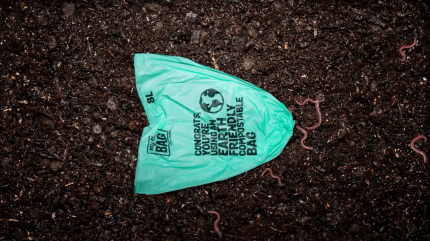
The Australian packaging market predicted to increase from 37bn units in 2023 to 40bn units in 2028 at a compound annual growth rate of 1.6%, and sustainable packaging group SECOS stands at the nexus of this.
SECOS’ CEO and executive director Richard Tegoni told Packaging Gateway about what is driving the “huge shift” underway in the sector.
The Melbourne-based company supplies its proprietary biodegradable and compostable resins, packaging products and cast films to a blue-chip international customer base.
This is alongside operating a product development centre and manufacturing plant for resins and finished products in China and a resins plant in Malaysia, within a global network of distributors.
SECOS recently secured a joint industry-university bid for $40m over ten years from the country’s Federal government to establish the Co-operative Research Centre (CRC), aimed at solving plastic waste, in a move that shows the interest and investment in material innovation in Australia.
Australian packaging regulations
Australia has among the highest regulations and standards in the world for composting and compostable packaging, which is SECOS’s speciality.

US Tariffs are shifting - will you react or anticipate?
Don’t let policy changes catch you off guard. Stay proactive with real-time data and expert analysis.
By GlobalDataTegoni states that these regulations “can be too strict at times, inhibiting innovation, research and opportunities.
“This has allowed non-sustainable alternatives to creep back into use – such as a resurgence of the misconception that paper is a comparatively environmentally friendly material.”
He also believes that the nation’s regulations and standards on conventional single-use plastic and the recycling industry are “very light and need to be improved”.
He proposes that limitations on compostable packaging should be applied to conventional plastic companies for consistency.
“We want to avoid companies opting for the less stringent regulations for onerous reasons that would not benefit sustainability efforts.”
This in turn would encourage the expansion of the compostable packaging industry in Australia. But Tegoni highlights the “threat that legislators will opt to limit the use of compostable packaging in favour of less sustainable packaging instead of banning traditional plastics and paper use.”
Another threat to the rollout of a successful circular economy in Australia is the nation’s lack of end-of-life facilities for products. Tegoni explains that the facilities are either too niche or conventional (accepting only one type of compostable waste).
Sufficient and efficient end-of-life facilities are crucial for more businesses and consumers at home to adopt sustainable packaging.
Driving the rise of compostable packaging
Australian consumers are increasingly comparing compostable packaging against traditional plastic and paper packaging.
Tegoni asserts that “there is an increase in awareness of the true meaning of circular living and zero waste solutions, especially by way of composting. Many are learning what can and cannot be composted, and the importance of leaving no microplastics behind in your scraps and waste.
“Consumers (especially avid gardeners and growers) are learning the importance of compost-rich soil, often called ‘Black Gold’ because of its value to their plants.”
According to Tegoni, change is also being driven by “frustration at the current state of packaging types which are not durable and only fit for single-use and have a large carbon footprint.”
The results of this demand for product innovation are striking. “Consumers command a loud voice to drive alternative packaging,” Tegoni says, “- a role that is not limited to just big plastics companies. Historically, innovative SMEs [small and medium-sized enterprises] or sustainability-focused companies are quicker to meet and deliver these consumer needs and demands.”
FMCG (fast-moving consumer goods) companies across the nation have been pressured to incorporate sustainability into their product packaging, such as Amcor’s provision of PCR plastic for Cadbury’s chocolate wrappers.
SECOS continues to develop compostable films and resins at its global research and development centre in Mount Waverley, Victoria, to drive down plastic waste.
Unpacking FOGO
Australian packaging is currently in a state of uncertainty. The country’s food organics and garden organics (FOGO) collection services are led by state, territory and local governments.
FOGO bins take all organic waste, including paper, cardboard and food scraps. Organic waste collected in the bins is then processed to create nutrient-rich, weed-free compost that can be used on farms, in parks and as fertiliser.
The original deadline for a national rollout of this kerbside collection initiative was 2023, but it has since been pushed back to the end of the decade. Currently, only around 30% of all Australians have access to a full FOGO service.
However, Tegoni believes this delay is no cause for pessimism, as the programme “has led to the adoption of more compostable packaging being applied to everyday lives over recycled items. The FOGO programmes have been essential in driving consumer education and awareness.”
Tegoni calls for councils across the nation to accept compostable packaging for FOGO bins. “This would drive companies like SECOS to innovate more products and the waste facilities to be better equipped.”
In the meantime, SECOS is selling compostable bin liners via FOGO tenders, which reportedly increased by 74% in the second half of 2023 compared to the previous year. This demand is set to grow as more local governments adopt FOGO collections.
SECOS has been sought to advise local councils and governments around the world on how to roll out FOGO programmes and the role of compostable bags, says Tegoni.
Wider adoption would also result in retailers, FMCG and food and beverage companies using more compostable packaging such as shopping bags, produce bags, cling film, box liners and pallet wrap.
Tegoni concludes: “What we are doing in Australia with organic waste diversion and compostable packaging is leading global trends and influencing worldwide decisions.”



